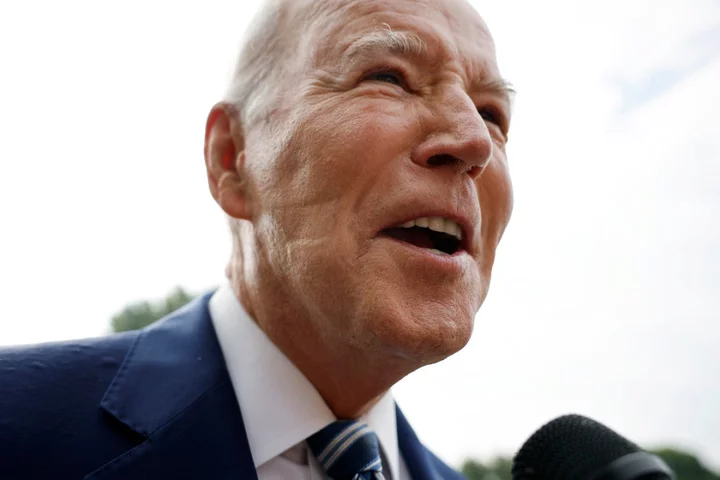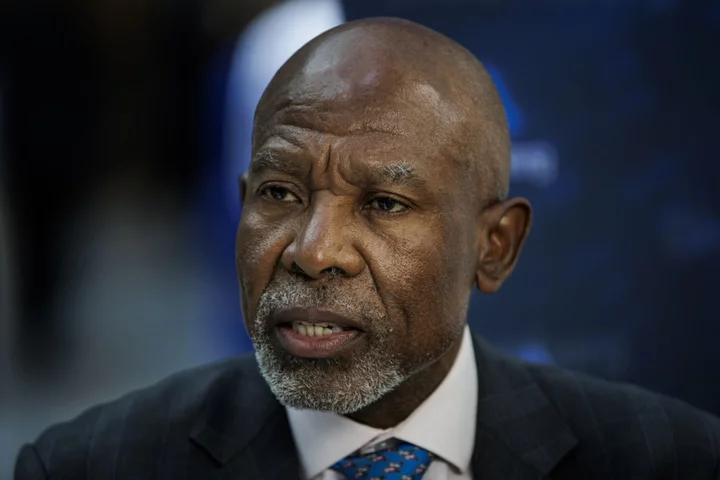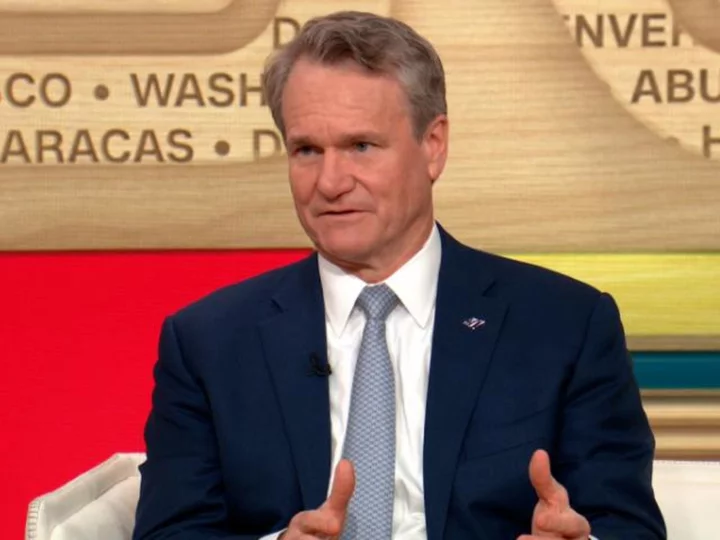
BMW to produce electric X3 model at South Africa plant
Germany's BMW will build its X3 model in South Africa from 2024, investing 4.2 billion rand ($225.09 million)
2023-06-29 15:56

Anheuser-Busch boss says no regrets over Dylan Mulvaney’s Bud Light ad despite uproar on right
The CEO of Anheuser-Busch InBev, the parent company of Bud Light, said the beer should be about bringing people together after it faced months of backlash following its brief partnership with transgender influencer Dylan Mulvaney. In an appearance Wednesday on the programme CBS This Morning, CEO Brendan Whitworth said the company has become entangled in “divisive” conversations it should not be a part of. “I think the conversation surrounding Bud Light has moved away from beer, and the conversation has become divisive,” Mr Whitworth said. “And Bud Light really doesn’t belong there. Bud Light should be all about bringing people together.” At the moment, that is not what’s happening. Bud Light last month lost its spot at the top of the beer sales charts to Modelo as some conservative customers continue to boycott the beer following the advertisements featuring Ms Mulvaney. Mr Whitworth declined to answer directly when asked whether the campaign featuring Ms Mulvaney was a mistake. “There’s a big social conversation taking place right now, and big brands are right in the middle of it and it’s not just our industry or Bud Light,” Mr Whitworth said. “It’s happening in retail, happening in fast food. And so for us what we need to understand — deeply understand and appreciate — is the consumer and what they want, what they care about, and what they expect from big brands.” Despite being given ample opportunity to do so, Mr Whitworth did not directly defend the corporation’s decision to partner with a trans influencer or to support the trans community more broadly at a time when that community is facing a barrage of legislation targeting its rights in states across the country. “Bud Light has supported LGBTQ since 1998, so that’s 25 years,” Mr Whitworth said. “And as we’ve said from the beginning, we’ll continue to support the communities and organisations we’ve supported for decades. But as we move forward, we want to focus on what we do best: which is brewing great beer for everyone.” The controversy over corporations’ politics is not limited to Bud Light. Disney, Target, Nike and a number of other brands have also been the target of the right’s ire in recent years for taking stances on social issues at odds with conservatives. Target recently announced its decision to remove some Pride month merchandise from its stores after facing criticism from conservatives for its relative support of the LGBTQ+ community. The Starbucks Workers Union, meanwhile, accused Starbucks of restricting Pride decorations from certain stores. Read More I came out as a teen in the 90s — there’s still a long road ahead for LGBT+ youth Starbucks workers at 150 stores to strike over alleged ban on Pride decor
2023-06-29 09:47

Biden touts his economic record in fiery speech: ‘Guess what – Bidenomics is working’
President Joe Biden touted his economic record amid continuing dissatisfaction among Americans with the state of the US economy by saying his policies have proven effective. Mr Biden delivered a fiery speech on Wednesday in Chicago where he sought to flip a term that the Wall Street Journal outlets have used against him--Bidenomics--into a plus. “I didn’t come up with the name,” he said. “I think it’s a plan I’m happy to call Bidenomics.” The president, who is seeking re-election in 2024, said that the US economy has largely recovered from the recession caused by the Covid-19 pandemic and had sought to refute Republican economics. “Guess what? Bidenomics is working,” he said to applause. “When I took office, the pandemic was raging and the economy was reeling. Supply chains were broken. Millions of people were unemployed.” Despite low unemployment, many Americans continue to see inflation as a top priority. A survey from the Pew Research Center last week showed that 52 per cent of Democrats and 77 per cent of Republicans say inflation is still a “very big problem.” Mr Biden sought to soothe those concerns by saying he continues to prioritise lowering prices and noted how inflation is less than half of what it was one year ago. “Bringing down inflation remains one of my top priorities today,” he said. Mr Biden also mentioned the progress that his signature Inflation Reduction Act has made, such as allowing Medicare to negotiate drug prices. “We’ve been trying to get this done for decades and this time we finally beat big pharma for the first time,” he said. Read More Watch as Biden makes statement on economic policy in Chicago Cambodian leader Hun Sen, a huge Facebook fan, says he is jumping ship to Telegram Paul Ryan says Trump is only Republican candidate who would lose to Biden in 2024
2023-06-29 02:29

Nigeria Vote Damaged Public Confidence in Democracy, EU Says
Nigeria’s elections this year were marred by problems that undermined public trust in democracy, European Union observers said.
2023-06-29 00:58

Dorset men in court over alleged tree investment fraud
The men are accused of fraudulently promising returns on a forestry scheme in Costa Rica.
2023-06-28 21:16

South Africa Central Bank Governor Sees Rates Higher for Longer
South Africa’s central bank will keep monetary policy tight for longer to tame persistent inflation, Governor Lesetja Kganyago
2023-06-28 17:18

Eskom Latest: Generation Improves, Off-Peak Blackouts Suspended
Eskom Holdings SOC Ltd., South Africa’s state power utility, will cut 2,000 megawatts of power from 7 a.m.
2023-06-28 14:56

Hacking Group Says It Attacked Microsoft for Sudan. Experts Say Russia’s Behind It
A hacking group responsible for a series of outages at Microsoft Corp. earlier this month had spent the
2023-06-28 13:27

Cuban entrepreneurs get business training from the US, and hope that Biden lifts sanctions
Musicians Ana María Torres and María Carla Puga started making bracelets and necklaces at home in Cuba during the pandemic, and they now have a flourishing business. On an island that for decades prohibited private enterprise, they have had an unlikely adviser: the U.S. Embassy. Torres and Puga are part of a small group of entrepreneurs benefiting from a business training program the embassy is offering in Cuba, where many young entrepreneurs are less wary of the American government than those in previous generations. “We see it as a great opportunity,” says Torres, 25, who co-founded a store and workshop named Ama, which has a cafeteria and employs 12 people. Ama is one of almost 8,000 small- and medium-sized companies that were legally authorized to operate in Cuba over the past year and a half. The embassy training featured weekly online meetings covering everything from marketing tools and brand management to basic finances and the creation of web pages. The owners of Ama were among 30 entrepreneurs the embassy selected from 500 applicants. Torres and Puga recall the look of fear — and surprise — in an older driver’s face when, on their way to exhibit some of their products, they asked him to drop them at the U.S. Embassy. The driver suggested he drop them off one block away instead. “Our generation doesn't really have so much limitation with respect to daring to take part in these kinds of things with the U.S. embassy, because the context is different,” says Puga, 29. “We know there are some conflicts, but we also know there is a lot that is being tried, especially with Cuban entrepreneurs, and we’re really not afraid.” In 1968, the Cuban government shut down the few remaining private businesses that were left on the island after the 1959 revolution. In 2010, however, then-President Raúl Castro initiated a reform to boost the local economy and allowed independent workers to work in activities like rental houses, restaurants and transportation. These were further developed amid a 2014 rapprochement with the U.S. during the administration of President Barack Obama. Sanctions also were eased during that period. Policy towards the island hardened during the administration of President Donald Trump, and the economy has yet to recover from its 11% contraction in 2020. In tourism alone -- a mainstay for national income -- the island welcomed just 1.7 million visitors last year, less than half the amount of 2018. Cubans have been feeling the effects of yet another crisis, reflected by long lines to get fuel, shortages of basic goods, blackouts, inflation and record emigration. In September 2021, Cuba legalized the creation of small- and medium-sized businesses to help an economy in crisis, a decision that Cubans and observers of the nation's politics viewed as historic. Since then, 7,842 small- and medium-size companies were created, along with 65 non-agricultural cooperatives, generating some 212,000 jobs combined. However, decades living in a state-dominated economy led to the loss of business know-how, including financial administration, marketing strategies, publicity and customer relations. “I am very happy with the renewed willingness of the United States embassy to pave the way for us in terms of knowledge... that is something we were lacking,” says Adriana Heredia, a 30-year-old partner of Beyond Roots, a private enterprise that includes a clothing store, a beauty salon specializing in afro hair and various other cultural projects. Cuban entrepreneurs say they appreciate efforts like the U.S. embassy’s business training program, but they also express concern about the negative impact the U.S.-imposed sanctions have had on their economy. “There is a negative impact (of the sanctions) that is evident,” economist Ricardo Torres, a researcher at the Center for Latin American Studies at the American University in Washington, told the AP. “The United States is the dominant market, the dominant economy. So all the financial and commercial restrictions that... weigh on entities that are based in Cuba will negatively affect entrepreneurs.” Last month, representatives of 300 small- and medium-sized businesses sent a letter to President Joe Biden requesting, among other things, facilitation of financial transactions, the establishment of some sort of permit for U.S. businessmen to invest in Cuba and trade with private companies, They also requested removal of the island from U.S. list of countries that sponsor terrorism. Cuban entrepreneurs feel they are caught between two forces: U.S. sanctions and limitations within Cuba itself such as high taxes, a lack of financing and state control over imports and exports. The island also lacks permits for professionals to establish themselves as independent workers. “Unfortunately, Cuba’s private enterprises end up being subjected to a sort of crossfire,” Torres said. The Biden administration has promised several times to reverse some measures affecting the island and its fledgling entrepreneurs, but the Cuban government says Washington has yet to deliver. Benjamin Ziff, charge d’affairs at the U.S. embassy in Cuba, dismisses claims that the administration has implemented few changes. He pointed to the resumption of some flights and the sending of remittances, as well as a slew of educational and religious exchanges between both nations. The embassy's business training classes, while a small measure to boost the private sector, is one of them. “Cuba’s future lies in its private sector and those who say it is a necessary evil are completely wrong,” Ziff said in an interview. “It is an increasingly necessary good for the well-being of the people.” Read More Ukraine war’s heaviest fight rages in east - follow live Charity boss speaks out over ‘traumatic’ encounter with royal aide Sierra Leone's president wins second term without need for runoff, election commission announces Music Review: Kim Petras makes flirty Eurodance-pop in major-label debut Eni chief executive says plan for pipeline to move gas to Cyprus 'part of our discussion'
2023-06-28 01:22

Bank of America CEO: Inflation could hit Fed's 2% target by 2025
US inflation could hit the Federal Reserve's 2% target in 2025, Bank of America CEO Brian Moynihan told CNN in an exclusive interview Tuesday.
2023-06-27 23:53

Brookfield values American Equity at $4.3 billion in takeover bid
By Niket Nishant (Reuters) -Annuities provider American Equity Investment Life Holding said on Tuesday it has received a takeover offer
2023-06-27 21:46

AmEx names insider Christophe Le Caillec as CFO after Campbell decides to retire
Credit card giant American Express Co said on Tuesday Chief Financial Officer Jeffrey Campbell has decided to retire
2023-06-27 20:24
